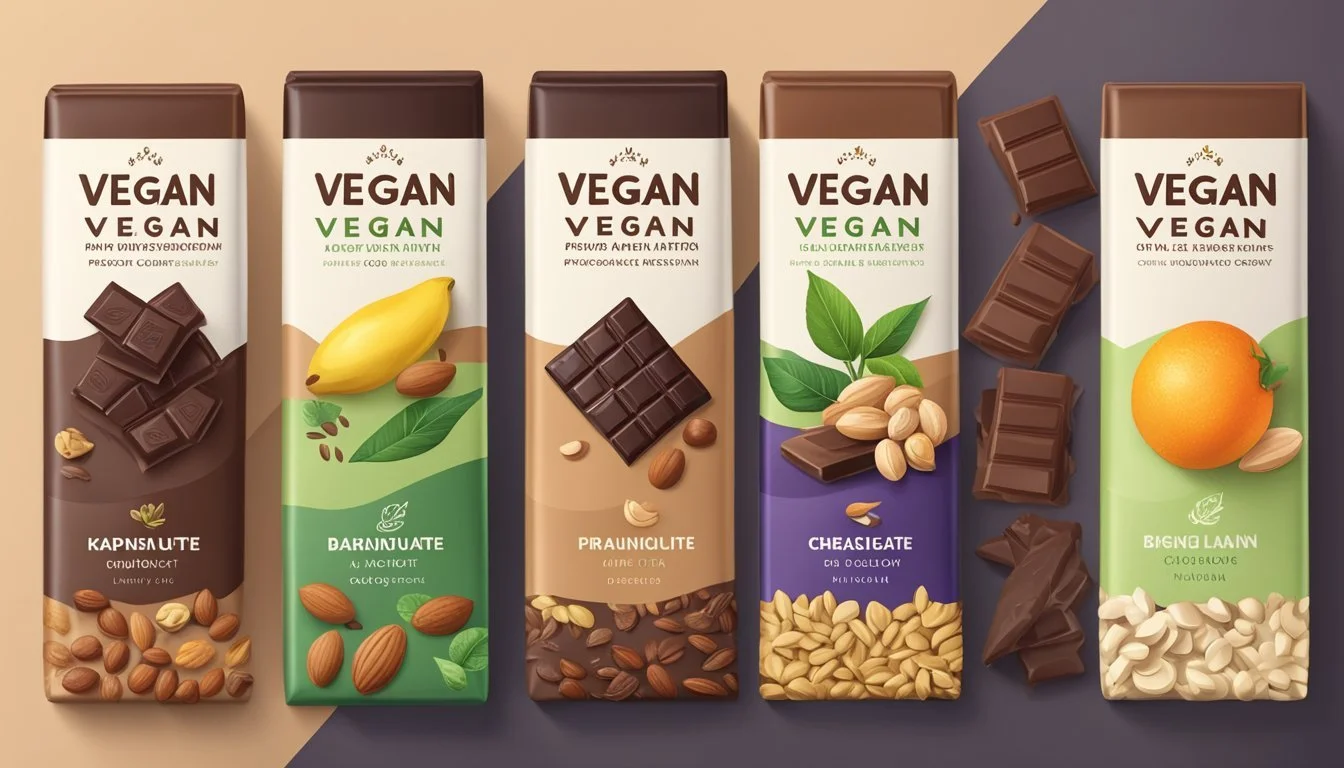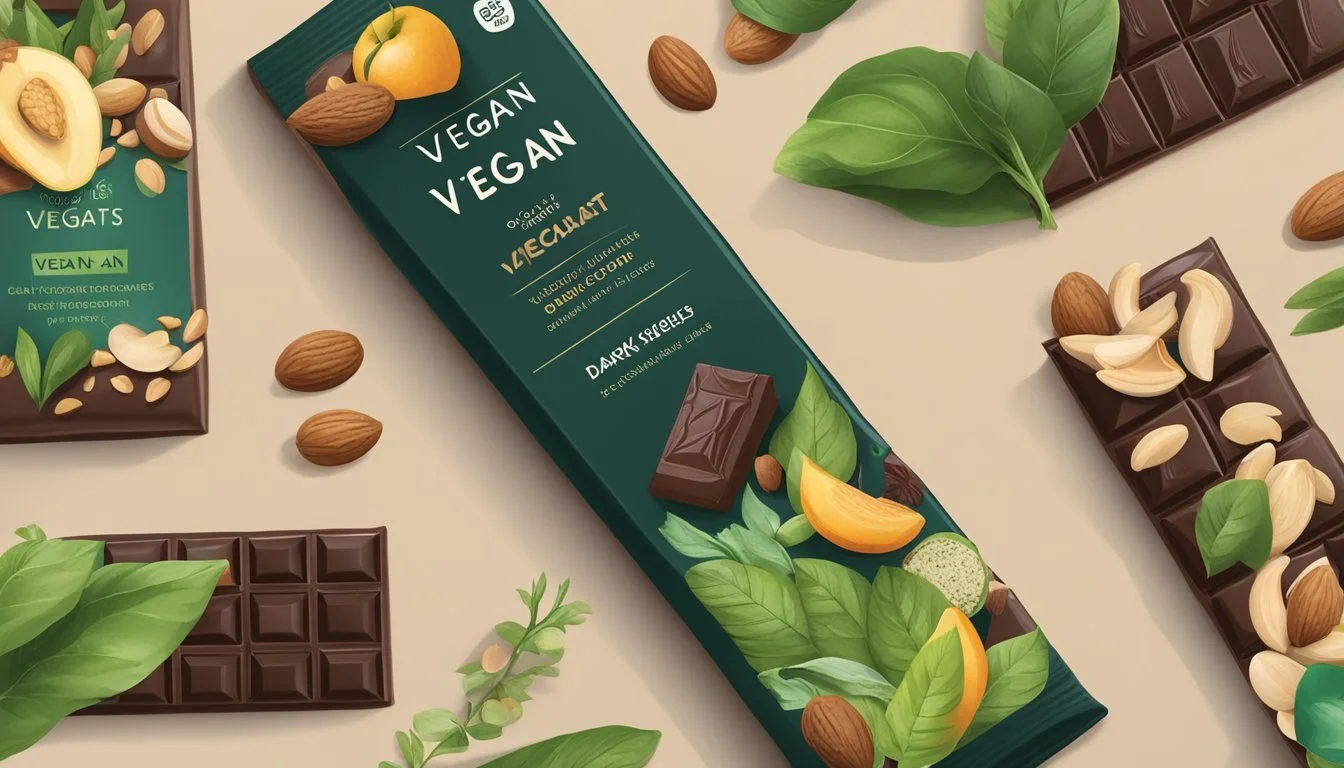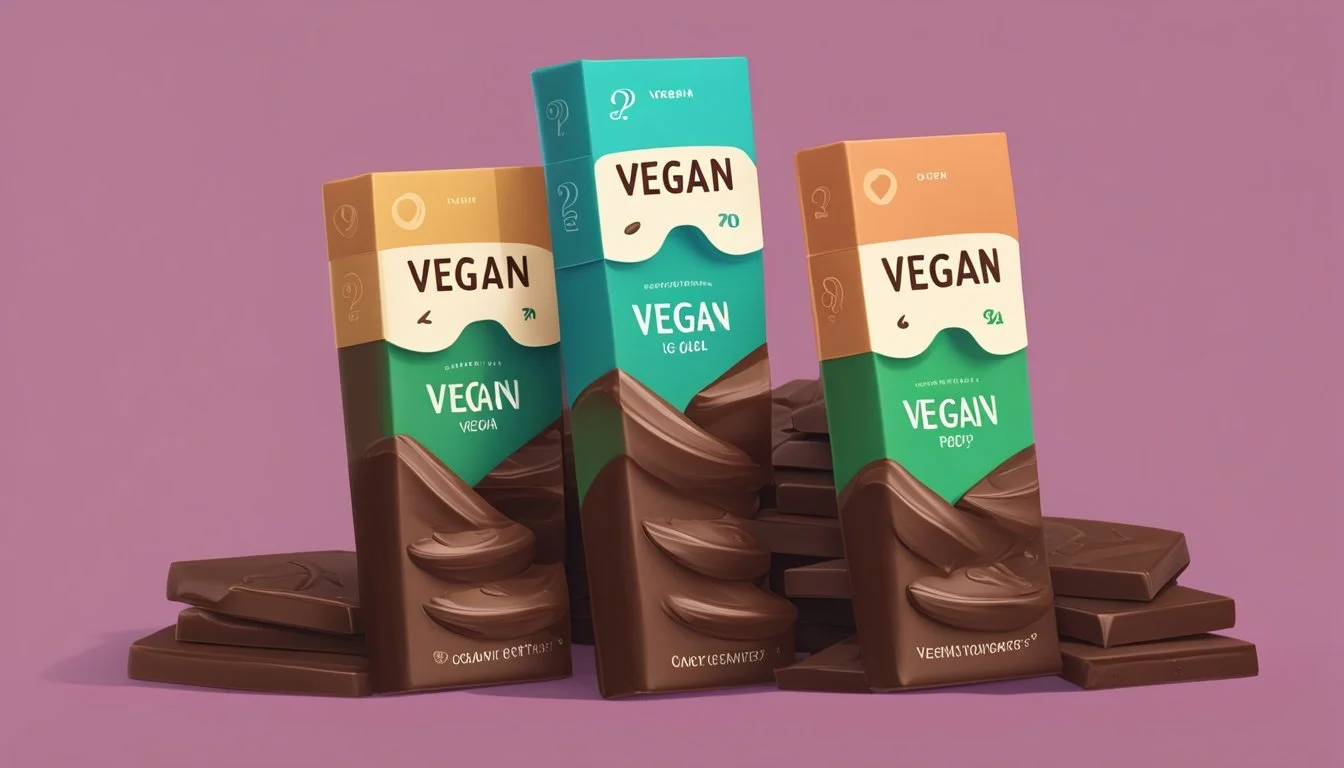Is Dark Chocolate Vegan?
Unveiling the Truth Behind Your Sweet Treats
Dark chocolate is often assumed to be a vegan product due to its high cacao content and the absence of milk, a product commonly found in milk chocolate. However, not all dark chocolates are created equal when it comes to meeting vegan standards. The determining factor for whether dark chocolate is vegan lies in its composition. Dark chocolate is characterized by a high percentage of cacao solids, with levels typically ranging from 50% to 90% or even higher. The remaining percentage is made up of other ingredients, which could include animal-derived products.
Consumers may find it tricky to identify vegan-friendly dark chocolate, as some manufacturers incorporate dairy ingredients such as milk fat, butter oil, or skimmed milk powder into their recipes, even those with high cacao percentages. This inclusion of dairy, no matter how small the quantity, disqualifies the dark chocolate from being vegan. Hence, it is vital for those following a vegan lifestyle to carefully review ingredient lists and seek products that specifically indicate they are vegan, as this suggests that the manufacturer took deliberate steps to avoid the use of animal-based ingredients.
In order to cater to the growing demand for plant-based products, an increasing number of brands now offer dark chocolate options that are certified vegan. These products assure consumers that no animal-derived ingredients are present, and often, such brands also address concerns such as ethical sourcing and fair trade practices. It is worthwhile for vegan consumers to seek out these brands as they provide the satisfaction of enjoying dark chocolate while adhering to the vegan ethos.
What Is Dark Chocolate?
Dark chocolate, known for its rich flavor and varying cocoa content, is a chocolate type distinguished by a high percentage of cocoa solids, including cocoa butter and cocoa powder. It often lacks the milk derivatives found in milk chocolate.
Cocoa Content and Varieties
Cocoa content in dark chocolate can range from 55% to 100%, impacting its flavor intensity and bitterness. The cacao bean is the fundamental ingredient. The cocoa percentage typically signifies the total amount of cocoa bean components present, including both cocoa solids and cocoa butter. Common varieties include:
55% - 70%: Mildly dark and less bitter
70% - 85%: Rich and more bitter
85% - 100%: Very bitter and less sweet
Health Benefits of Dark Chocolate
Dark chocolate is lauded for containing antioxidants like flavonoids, which are beneficial for heart health and reducing inflammation. However, the actual health benefits can vary depending on the cocoa content; higher percentages generally lead to more antioxidants but also more bitterness.
Manufacturing Process
The manufacturing process of dark chocolate begins with harvesting cocoa beans from the cocoa tree. Post harvesting, the beans are fermented, dried, roasted, and ground into cocoa mass or chocolate liquor. Subsequently, cocoa butter and sweeteners are added. Emulsifiers such as soy lecithin may be incorporated to improve texture.
Popular Dark Chocolate Brands
A variety of manufacturers produce dark chocolate, with each brand offering something unique. Notable dark chocolate brands include:
Lindt: Known for smooth, refined chocolate with various cocoa percentages.
Ghirardelli: Offers intense, full-bodied chocolate with a hint of vanilla.
Trader Joe's: Provides affordable and diverse chocolate options.
Vegan consumers should look for vegan dark chocolate brands that do not include milk derivatives, such as:
Hu: Vegan and organic chocolate with minimal ingredients.
Theo: Fair trade and organic with unique flavor combinations.
Alter Eco: Sustainable and ethically sourced, offering vegan options.
Raaka Chocolate: Vegan chocolate that is unroasted to retain the bean's flavor nuances.
Other noteworthy brands for vegan consumers are Pascha Chocolate, Chocolove, Dandelion Chocolate, and Enjoy Life, which are dedicated to producing chocolates that cater to dietary restrictions, including dairy-free variants.
Understanding Veganism
Veganism is a dietary and lifestyle choice that excludes the use of animal products. This section delves into the core aspects of this lifestyle, examining its definition, contrasting it with vegetarianism, and discussing its implications for health and the environment.
Definition and Principles
Veganism is defined as a way of living which seeks to exclude, as far as is possible and practicable, all forms of exploitation of, and cruelty to, animals for food, clothing, or any other purpose. Individuals who adhere to veganism are known as vegans. They avoid all animal products, including meat, dairy, eggs, and honey, as well as materials like leather and wool. Vegan-friendly products, such as vegan chocolate, are made without any animal-derived ingredients and are suitable for a vegan lifestyle.
Vegan vs. Vegetarian
While both vegans and vegetarians exclude meat from their diets, vegetarians may still consume other animal products such as dairy and eggs. Vegans, on the other hand, extend this exclusion to all animal byproducts, making their diet strictly plant-based. Veganism is not only a dietary choice but also a broader ethical stance against animal exploitation, while vegetarianism primarily focuses on the avoidance of meat consumption.
Vegetarian Diet: Often includes:
Dairy products (cheese, milk)
Eggs
Vegan Diet: Excludes all animal-derived ingredients:
Meat, dairy, eggs
Honey
Gelatin
Health and Environmental Impact
Adopting a vegan diet can have significant health benefits, including lower risks of heart disease, high blood pressure, type 2 diabetes, and certain types of cancer. Plant-based diets are typically high in dietary fiber, vitamins, and phytonutrients while being lower in calories and saturated fats.
From an environmental standpoint, a vegan lifestyle can lead to a reduction in one's carbon footprint. Animal agriculture is a major contributor to greenhouse gas emissions, deforestation, and water consumption. Therefore, a shift towards plant-based eating is considered by many as a positive step for the environment.
Health Benefits:
Reduced risk of chronic diseases
Often higher intake of fruits and vegetables
Environmental Benefits:
Lower greenhouse gas emissions
Decreased deforestation
Reduced water usage
Ingredients in Dark Chocolate
When examining the ingredients in dark chocolate, it is crucial to differentiate between those that are vegan and non-vegan, as well as to understand potential allergens and the significance of labels and certifications.
Common Non-Vegan Ingredients
Non-vegan ingredients commonly found in dark chocolate include milk powder, whey, lactose, and milk fat. These are derivatives of dairy and are often added to chocolate products to alter texture or taste.
Milk Powder: Sometimes added for creaminess.
Whey: A byproduct of cheese making.
Lactose: A sugar derived from milk.
Milk Fat: The natural fat found in dairy.
Vegan-Friendly Alternatives
Vegan dark chocolates substitute dairy with plant-based milks or omit it altogether. Cocoa butter, sugar, and cacao solids typically comprise the base, while almond milk, coconut milk, or cashew milk might be used for creaminess.
Cocoa Butter: A vegan fat derived from the cacao bean.
Plant-Based Milks: Provide creaminess without dairy.
Potential Allergens and Additives
Dark chocolates may include allergens like soy lecithin or gluten. Vegans should also be aware of additives that are not animal-derived but might be unhealthy or unwanted, such as artificial flavors or excessive sugar.
Soy Lecithin: An emulsifier from soybeans.
Gluten: A protein found in wheat, barley, and rye.
Understanding Labels and Certifications
Labels and certifications such as vegan, organic, fair trade certified, and non-GMO are indicators of a product's ingredients and ethical standards. Consumers should look for these certifications, as they can quickly identify if dark chocolate aligns with their dietary preferences and values.
Vegan Label: Ensures the absence of animal products.
Organic: Indicates that ingredients were grown without synthetic pesticides.
Fair Trade Certified: Supports responsible company practices.
Non-GMO: Guarantees that the product does not contain genetically modified organisms.
By examining the ingredients, allergens, and labels could help ensure that the dark chocolate they choose adheres to their vegan lifestyle.
Identifying Vegan Dark Chocolate
When selecting vegan dark chocolate, it is crucial for consumers to understand labeling, be aware of potential cross-contamination issues, and recognize trusted vegan brands.
Label Interpretation and Mislabeling
Consumers should look for a clear vegan label on dark chocolate products as this indicates the absence of animal ingredients. However, they must also be wary of mislabeling. Some dark chocolates may be labeled as vegan but can still contain trace amounts of milk, either because of shared equipment or mislabeled ingredients. The term "may contain milk" is often used and should make shoppers cautious, as it implies potential cross-contamination with dairy.
Cross-Contamination Concerns
Vegan dark chocolate might be produced on machinery that also processes milk chocolate, raising the issue of cross-contamination. This risk implies that there might be trace amounts of milk in the chocolate, which is a significant concern for those avoiding all animal products. Consumers should research the manufacturing process or look for chocolates specifically labeled as "dairy-free" to avoid inadvertent dairy consumption.
Recommended Vegan Dark Chocolate Brands
Selecting from trusted brands can simplify finding authentic vegan dark chocolate. Some noteworthy brands include:
Hu: Known for high-quality ingredients and a commitment to no dairy or other animal products.
Alter Eco: Provides a range of dark chocolates certified to be organic and fair-trade.
Taza: Recognized for their stone-ground chocolate making process, which favors minimal processing.
Endangered Species: Offers a variety of flavors while contributing to conservation efforts.
Lake Champlain: Produces gourmet chocolates that often feature organic and fair-trade certifications.
No Whey!: Focuses on allergen-free products, ensuring no dairy is used across their range.
Enjoy Life: Offers a selection of chocolates that are not only vegan but also free from common allergens.
By carefully examining the labels and choosing from reputable brands, consumers can enjoy vegan dark chocolate without compromising on ethics or taste.
Dark Chocolate in Vegan Cooking and Baking
Utilizing dark chocolate in vegan recipes requires careful selection and preparation to ensure that the final dish remains dairy-free while retaining the desired taste and texture.
Substituting Dark Chocolate in Recipes
When replacing milk chocolate with vegan dark chocolate, aim for a cocoa content of 70% or higher, as it is more likely to be dairy-free. It is vital to read the ingredient label to confirm the absence of milk derivatives. Dark chocolate can be substituted in the same quantity as non-vegan chocolate, but additional sweeteners may be necessary to match the desired sweetness.
Homemade Vegan Chocolate Options
Creating homemade chocolate allows complete control over the ingredients. A basic vegan chocolate recipe might include:
Cocoa butter: The fat extracted from cocoa beans
Cocoa powder: The non-fat component of cocoa beans
Sweetener: Often maple syrup, agave nectar, or sugar
Optional additions: Vanilla extract, salt, or coconut milk for creaminess
Mix ingredients and set in molds to create homemade chocolate bars, chips, or shavings for baking recipes.
Specialty Vegan Chocolate Products
The market offers a variety of specialty vegan chocolate products that cater to baking and cooking needs. These include chocolate chips, chocolate bark, and vegan chocolate truffles (What wine goes well with truffles?). When choosing commercial products, one must ensure the manufacturer certifies them as vegan to avoid cross-contamination with dairy products.
Tips for Vegan Chocolate Preparation
To successfully incorporate vegan dark chocolate into dishes, consider the following tips:
Melting: Dark chocolate should be melted slowly using a double boiler or microwave at low power to avoid burning.
Baking: For recipes such as vegan chocolate mousse, the use of high-quality chocolate paired with dairy alternatives like coconut milk can achieve a rich, satisfying flavor.
Candies: When making vegan candies or truffles, choose dark chocolate with a smooth texture to ensure a refined finish.
By selecting the right ingredients and adopting proper methods, dark chocolate can be a versatile staple in vegan cooking and baking.
Frequently Asked Questions
In exploring the compatibility of dark chocolate with a vegan diet, consumers often encounter a range of questions. The distinctions between vegan and vegetarian, presence of dairy, and gluten inclusion play crucial roles when evaluating dark chocolate products.
Is Vegan Chocolate Gluten-Free?
Vegan chocolate does not inherently guarantee being gluten-free. Individuals must check the product label for ingredients since gluten can be present in additives such as barley malt or wheat-based fillers. For true gluten-free assurance, one should opt for chocolates that are certified gluten-free.
Does Dark Chocolate Always Mean Vegan?
Dark chocolate itself is derived from cocoa beans, a plant-based ingredient. However, not all dark chocolate is vegan. Some products, even those labeled as 70% dark chocolate, may contain milk, milk solids, or lactose. It is essential to review ingredient lists for any dairy content to ensure the dark chocolate adheres to vegan standards.
Can Vegans Eat Chocolate-Based Sweets Like Nutella?
Classic Nutella and similar chocolate-based sweets usually contain dairy products and are not vegan. Consumers looking for vegan alternatives should search for spreads that are specifically labeled as vegan, which do not include milk chocolate or other animal-derived ingredients.
Why Do Some Dark Chocolates Contain Milk?
Some manufacturers add milk to dark chocolate to alter its texture and flavor, creating a smoother and less bitter product. This inclusion of dairy makes such chocolate varieties unsuitable for vegans. Consumers should look for dark chocolate labeled dairy-free or vegan or check for milk products in the ingredient list.





